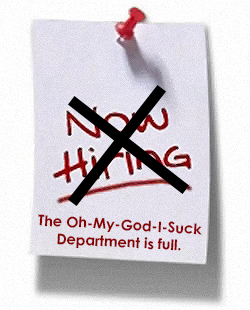A writer’s routine means sweet f*ck-all
I know writers who get up two hours early every day to get shit done before the world interferes.
I know writers who shut off their phones and Facebook for their scheduled midday “writing time.”
I know writers who have daily schedules, minutely defining when and how long they work on chapter XYZ, polish a troublesome paragraph, eat, and go for a walk.
You ask me all the time what a “real” writer’s day looks like. I always answer the same way (albeit not publicly, until now): Who is this “real” writer you speak of? And why do you give a shit how he spends his time?
YOU don’t need to follow someone else’s routine or rules in order to be a “writer.”
YOU don’t need to arrange your desk the way Stephen King does in order to have a bestseller.
 YOU don’t need to use trendy new software to jam out the novel of your dreams.
YOU don’t need to use trendy new software to jam out the novel of your dreams.
YOU only need to write – in the way only YOU can.
Understandably, some people need structure or discipline so they can get in the habit of writing regularly.
What we don’t need is someone else’s structure. How J.K. Rowling parts her curtains in the morning is irrelevant. That’s another stall tactic. Another way to say, ‘Oh, my desk, office, [insert bullshit excuse] isn’t ready yet. I can’t write today.’
Enough screwing around.
But don’t take my word for it. Below are thoughts from five famous authors on their own daily routines:
Ray Bradbury oftensaid he could work anywhere. “I wrote in bedrooms and living rooms when I was growing up with my parents and my brother in a small house in Los Angeles. I worked on my typewriter in the living room, with the radio and my mother and dad and brother all talking at the same time. Later on, when I wanted to write Fahrenheit 451, I went up to UCLA and found a basement typing room where, if you inserted ten cents into the typewriter, you could buy thirty minutes of typing time.”
Kurt Vonnegut‘s famous routine included Scotch and swimming: “In an unmoored life like mine, sleep and hunger and work arrange themselves to suit themselves, without consulting me.”
Joan Didion said “the drink” helped. She also had an interesting way to complete a book. “Another thing I need to do, when I’m near the end of the book, is sleep in the same room with it. That’s one reason I go home to Sacramento to finish things. Somehow the book doesn’t leave you when you’re asleep right next to it.”
Jack Kerouac answered a question about his daily routine this way: “I’m beginning to suspect the full moon. Also I’m hung up on the number nine though I’m told a Piscean like myself should stick to number seven; but I try to do nine touchdowns a day, that is, I stand on my head in the bathroom, on a slipper, and touch the floor nine times with my toe tips, while balanced. This is incidentally more than yoga, it’s an athletic feat, I mean imagine calling me ‘unbalanced’ after that.”
Perhaps the late, great E.B. White said it best: “A writer who waits for ideal conditions under which to work will die without putting a word on paper.”
When someone asks about my writing routine, I quote Ferris Bueller. “You realize if we played by the rules, right now we’d be in gym?”
By now, my advice for nearly all things writing may have become an aggressively mediocre cliché, but I hope you’ll still use it regularly: Fuck the rules. Just write.
• • •
Don’t know where to start? Stuck, stalled, uninspired? Hit me up. And be sure to subscribe to this site in the upper right-hand corner. That way, I can send the sexiest, most liberating and inspiring tidbits of writing advice straight to your inbox.

